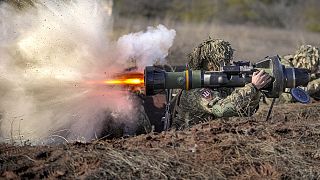Ukraine war: The latest developments you need to know this Friday

1. Kyiv and Moscow sign key grain exports deal, cargo ships to depart as early as Saturday
Ukraine and Russia signed a breakthrough agreement on Friday, designed to help relieve a global food crisis caused by blocked Black Sea grain exports.
The ceremony marks the first major deal between the warring sides since Russia's February invasion of its neighbour and comes as global food prices have soared, and people in some of the world's poorest countries are facing starvation.
Kyiv and Moscow signed two identical but separate documents at the request of Ukraine, which refused to initial any document with Russia.
Under the agreement, "safe corridors" will allow the movement of cargo ships in the Black Sea, which "both sides have committed not to attack," said a UN official who requested anonymity.
Negotiators abandoned the idea of clearing the Black Sea of mines -- mainly laid by the Ukrainians to protect their coastline. "Clearing mines would have taken too long," the UN said, adding that "Ukrainian pilots" would clear the way for cargo ships within Kyiv's territorial waters.
Read more here:
2. Moldova's breakaway region of Transnistria wants to unify with Russia
The foreign minister of Transnistria has said that the separatist region is committed to achieving independence from Moldova and possible unification with Russia and that Moldova's recent EU candidacy status effectively ends any possibility of cooperation.
Transnistria, a sliver of land lying between Ukraine and the rest of Moldova, has hosted a contingent of Russian peacekeeping forces since the end of a separatist war in 1992. After Russia sent troops into Ukraine in February, speculation has risen that Moscow would aim to take control of the territory.
In April, a series of explosions in the territory, which has roughly 470,000 inhabitants, caused tensions to soar.
Vitaly Ignatyev, the unrecognised government's foreign minister, told a news conference in Moscow that Transnistria will pursue the goals determined in a 2006 referendum, which saw almost 100% of voters back independence from Moldova and potential Russian integration. The referendum was widely seen as illegitimate by the international community.
Read more here:
3. Lavrov to visit Africa as Kremlin looks for allies outside of Europe and the West
Russian foreign minister Sergei Lavrov will begin an African tour in Egypt on Sunday, seeking to draw on demand for non-Western alliances as Moscow pushes back against international censure over the war in Ukraine.
In Egypt, Lavrov will meet officials trying to square deep links to Russia with their close relationship with the United States, which along with other Western powers, sought to isolate Russia with tough sanctions after its 24 February invasion of Ukraine.
After meeting Arab League members in Cairo, he will travel to Ethiopia and Uganda, two countries whose relations with the West have come under strain, as well as Congo Republic.
Egypt has significant strategic and economic ties with Russia, which has been a key source in recent years of wheat, weaponry and - until the war complicated travel - tourists.
This week, Russian state-owned energy corporation Rosatom started long-delayed construction on Egypt's first nuclear plant, the largest Russian-Egyptian project since the Aswan High Dam on the Nile was completed in 1970.
Those ties have caused angst with Western states, a group of which petitioned the Egyptian government and the Arab League ahead of Lavrov's visit not to play into Russia's version of events in Ukraine, diplomats said.
4. Moscow claims it destroyed half of US-supplied HIMARS rocket systems, Kyiv denies it
Russia's defence ministry said on Friday its forces had destroyed four US-supplied high mobility artillery rocket systems (HIMARS) in Ukraine earlier this month.
Between 5-20 July, "four launchers and one reloading vehicle for the US-made multiple launch rocket systems (HIMARS) were destroyed," it said in a daily briefing.
Kyiv rejected Moscow's claims, calling them "fakes" designed to undermine the West's support for Ukraine.
Kyiv has hailed the arrival of eight HIMARS in Ukraine as a possible gamechanger for the course of the war, now about to enter its sixth month.
The advanced weapons are more precise and offer a longer range than other artillery systems, allowing Kyiv to strike Russian targets and weapons depots further behind the front lines.
5. Donetsk and Luhansk separatist territories ban Google
The authorities in Ukraine's two Moscow-backed separatist territories have announced that they have blocked the world's biggest internet search engine, Google, accusing it of "promoting" violence against Russians.
Google "promotes terrorism and violence against all Russians, especially the population of the Donbas (...) We have decided to block Google on the territory" of the Donetsk region, separatist leader Denis Pushilin said in a statement Friday.
On Thursday, the leader of the neighbouring separatist region of Lugansk, Leonid Pasechnik, announced that he had taken the same step.
The Kremlin-supported and armed separatist authorities in eastern Ukraine, like Russia, have been seeking to tighten their control over information since Moscow launched its offensive against Ukraine in late February.
In Russia, new laws have been passed that allow courts to dole out heavy prison sentences to those who publicise what the authorities deem to be "false information" about the army or Russia's invasion of Ukraine, demanding it to be labelled as "special military operation".
Russia has blocked major social networks such as Facebook, Twitter and Instagram. The country, which has its own search engine, Yandex, has been trying for years to develop a sovereign internet, like China.
No comments:
Post a Comment